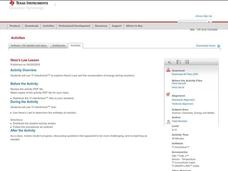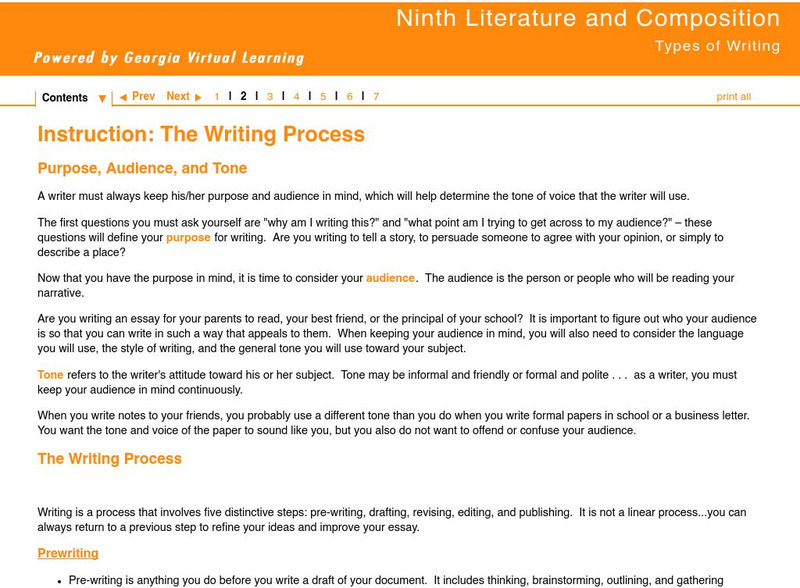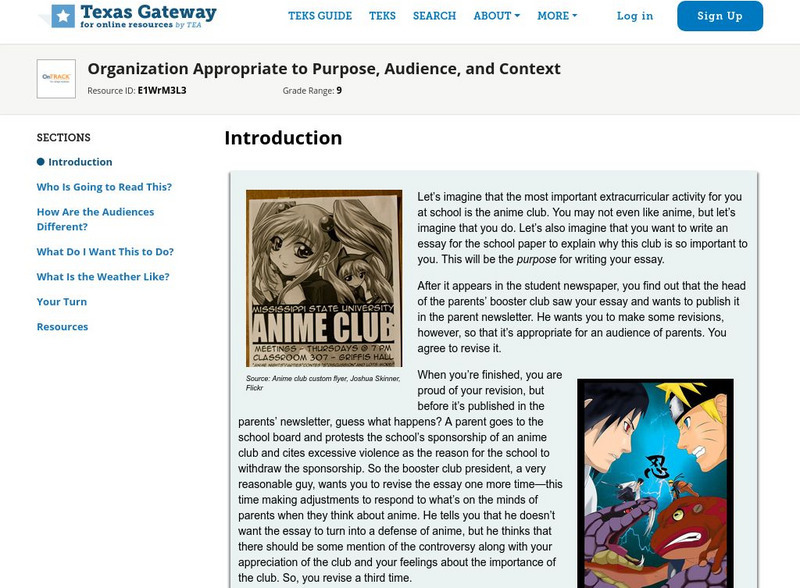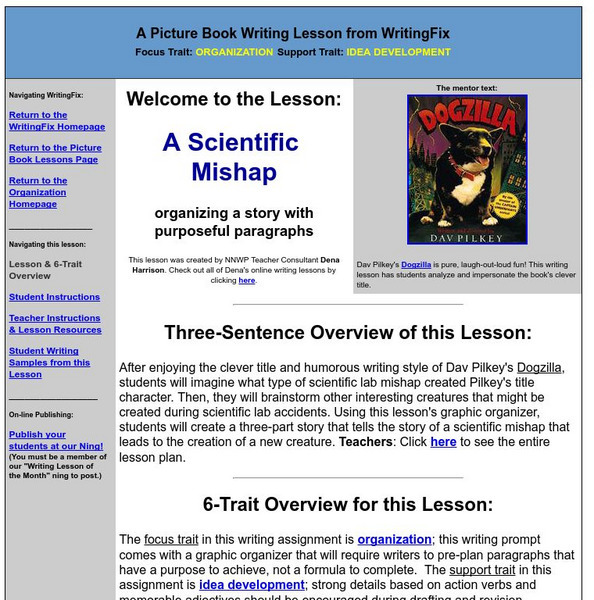Curated OER
Hess's Law
Pupils solve chemical equations. In this chemistry lesson, they balance chemical equations after completing a lab. They can use a TI for this assignment.
Curated OER
Energy Content of Foods
Learners collect data, organize and analyze the data and compare it to real life scenarios. This assignment requires two class periods.
Curated OER
Introduction to Electric Circuits
High schoolers explore using a circuit board in this physics lesson. They will analyze current and battery set up on a circuit board. Teachers check the board before the students experiment.
Curated OER
Keep it Bottled Up: Linear Rates of Pressure Increase
Pupils explore linear functions in this lesson when they collect and analyze data as a chemical reaction proceeds. Learners record pressure versus time data and model the data as a linear function. They also examine the concept of slope...
Curated OER
Falling Objects
High schoolers examine the velocities of two different falling objects. They produce distance vs. time and velocity vs. time graphs using a Motion Detector and a CBL 2 to collect experimental data. Learners analyze and interpret the...
Curated OER
When the Snow is as High as an Elephant
High schoolers study the concept of mean values using a data plot. Learners enter the given data in the activity to create their data table. They use the data table to calculate the mean of the snowfall percentage provided in the...
Curated OER
Corn-Crop is a Bin-Buster
Learners calculate percent change and create lists of data. They enter the corresponding bushels of corn measured in billions to their list and display, then convert the acres into scientific notation and use the value on the home screen...
Curated OER
Angling for Distance
Explore the concept of projectile distance through determining the angle that will provide the maximum distance of a launched projectile. Young scholars launch baseballs on a football field and video tape the path of the ball.
National Endowment for the Humanities
Slavery and the American Founding: The "Inconsistency Not to Be Excused"
High schoolers examine slavery in the revolutionary and colonial eras of the United States. In this slavery lesson, students investigate the presence of slavery in early America, the language of the Constitution, and the intent of the...
National Endowment for the Humanities
Lesson 3: Religion and the Fight for American Independence
Pupils explore the role religion played in the American Revolutionary War. Using primary documents and writing exercises, students understand how religion was used in support of the war efforts and how specific religious groups responded...
National Endowment for the Humanities
Lesson 2: The Debate in Congress on the Sedition Act
Pupils research and discuss the provisions in the Constitution that supported the arguments for and against the Sedition Act. They articulate objections to and arguments in favor of the Sedition Act.
National Endowment for the Humanities
Chinua Achebe's Things Fall Apart: Oral and Literary Strategies
Readers are first introduced to Chinua Achebe's Things Fall Apart by making a map of Africa. They will better understand the novel's historical and literary contexts, European and African literary traditions, and how historical events...
Other
Introducing Plain Language
This site by Plain Language Online states that plain language "begins with the needs of the reader," which will determine why and how the writer writes. It goes on to elaborate on audience and purpose, idea organization, use of...
Annenberg Foundation
Annenberg Learner: Build a Rubric
Rubrics provide students with clear expectations and consistent feedback. Build a customizable rubric that can be used for any writing activity your class might be completing.
Georgia Department of Education
Ga Virtual Learning: Ninth Lit and Comp: Types of Writing: The Writing Process
This lesson focuses on the writing process including understanding purpose, audience, and tone and the parts of the writing process: prewriting, drafting, revising, editing, and publishing.
Colorado State University
Colorado State Writing Center: Understanding Your Purpose
Use the links on the right to get a better understanding of purpose in writing including the types of purposes and how audience affects purpose. Click on Purpose and Audience and Purpose and Strategies. W.9-10.4 Write/Audience/Purpose;...
Texas Education Agency
Texas Gateway: Writing to a Particular Audience and Purpose English Iii Writing
[Accessible by TX Educators. Free Registration/Login Required] You will learn various rhetorical strategies you can use in writing for a particular audience and purpose.
Texas Education Agency
Texas Gateway: Organization Appropriate to Purpose, Audience, and Context
[Accessible by TX Educators. Free Registration/Login Required] Write an essay that is organized appropriate to audience, purpose, and context. W.9-10.4 Write/Aud/purp, W.11-12.4 Clear/Coherent Writing
Texas Education Agency
Texas Gateway: Organization Appropriate to Purpose, Audience, and Context
[Accessible by TX Educators. Free Registration/Login Required] You will be able to write an essay that is organized appropriate to audience, purpose, and context.
Joe Landsberger
Organizing and Pre Writing: Seven Stages of Writing Assignments
This research-based site provides step-by-step directions needed to complete an extended writing piece.
AdLit
Ad lit.org: A Sample Rubric for Grading Student Writing
All written work should be assessed using a rubric. Using a set of criteria linked to standards not only allows for uniform evaluation, but helps students understand what is important about an assignment and encourages them to reflect on...
AdLit
Ad lit.org: Teach the Elements of Writing
It's a misconception that writing teachers simply tell students to write and wait to see what happens. Teachers should provide instruction in and exposure to various elements of writing to help students understand what good writing is.
AdLit
Ad lit.org: Key Literacy Component: Writing
Students who don't write well aren't able to learn and communicate effectively. This article explains what good writing skills are and how to help struggling young writers gain those skills through proper instruction.
Writing Fix
Writing Fix: Organizing a Story With Purposeful Paragraphs
In this instructional activity, learners organize and design a narrative based on three developing ideas.
























